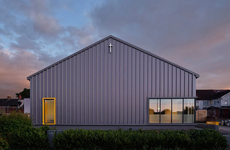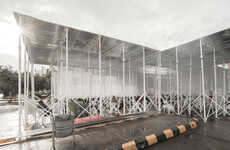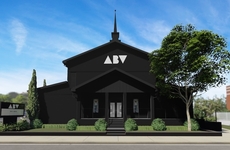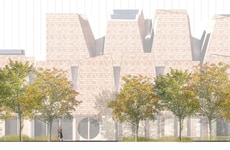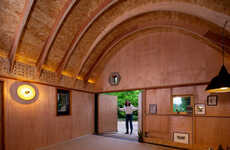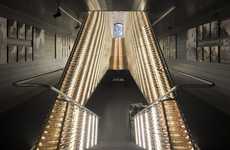
The Kevin Bauman 'Small Churches' Collection Shows Simplistic Faith
Senduran Bhakthakumaran — March 1, 2012 — Fashion
References: kevinbauman & ignant.de
The Kevin Bauman 'Small Churches' series brings together a solid collection of photographs that depict a strong message about religion. Size does not matter. The feeling one derives from any sort of devotion can come from the most unlikeliest, and smallest of places.
The photographs show chapels that are merely rented out spaces, or small establishments that have been worn down with time. The sole fact remains, however, that they are still standing. Worship can take place anywhere, and so long as respect for an establishment remains, its purity will not be comprised. The Kevin Bauman Small Churches collection is an eye-opener, as such churches are rarely seen, but must be appreciated and respected for those who attend these places on a regular bases.
The photographs show chapels that are merely rented out spaces, or small establishments that have been worn down with time. The sole fact remains, however, that they are still standing. Worship can take place anywhere, and so long as respect for an establishment remains, its purity will not be comprised. The Kevin Bauman Small Churches collection is an eye-opener, as such churches are rarely seen, but must be appreciated and respected for those who attend these places on a regular bases.
Trend Themes
1. Rented-out Spaces - The trend of rented-out spaces for religious purposes presents opportunities for disruptive innovation in flexible and affordable worship spaces.
2. Worn-down Establishments - The trend of utilizing worn-down establishments as religious spaces opens up opportunities for repurposing and revitalizing unused buildings for community worship.
3. Unconventional Places of Worship - The trend of finding unconventional places of worship emphasizes the need for adaptable and inclusive religious environments that cater to diverse worshipers and their needs.
Industry Implications
1. Real Estate - The real estate industry can explore disruptive innovation by developing specialized spaces for religious gatherings, such as rented-out spaces or repurposed worn-down establishments.
2. Architecture - The architecture industry can seize disruptive innovation opportunities by designing adaptable and inclusive spaces that cater to unconventional places of worship, creating unique spiritual experiences.
3. Community Development - The community development industry can contribute to disruptive innovation by facilitating the transformation of unconventional spaces into community-driven worship centers, fostering a sense of inclusivity and belonging.
0.6
Score
Popularity
Activity
Freshness

